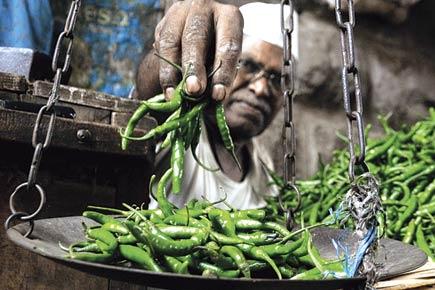On Thursday, Saudi Arabia, the fifth-largest importer of fresh vegetables from India, returned the shipment of Indian chilli, citing high levels of pesticide residues in the shipped commodity

With Saudi Arabia refusing to accept shipment of over six tonnes of imported chillies from India, prices of the spicy produce have spiralled downwards at the Agriculture Produce Market Committee (APMC) in Vashi. Wholesale price of the commodity has halved from the earlier Rs 24-36 to Rs 12-16 per kg now, according to traders.
ADVERTISEMENT

Decision to ban import of chillies from India was made after a sample testing from the Indian shipment showed the presence of high levels of pesticides
On Thursday, Saudi Arabia, the fifth-largest importer of fresh vegetables from India, returned the shipment of Indian chilli, citing high levels of pesticide residues in the shipped commodity.
“The agents in Saudi Arabia found pesticide levels exceeding the prescribed level in the consignment that was shipped from the APMC market. The pesticide percentage level was 0.1 to 1.0, surpassing the prescribed level of 0.5 per cent,” an export trader at APMC said.
Hard to digest
Already reeling from the temporary ban imposed by the European Union (EU) on export of four vegetables and Alphonso mangoes in May, the latest ban is likely to hit exporters and farmers. “Approximately 300 tonnes of green chillies arrive at APMC market daily.
Of this, about 50 tonnes are distributed to local markets while the remaining is exported. Now that the ban has been imposed, prices are bound to fall sharply, affecting our incomes,” a green chilli trader at APMC market said.
“Earlier we used to sell our produce for anything between R30 per kg in the wholesale market. But after the ban, we are getting only half the money or less then that,” said a farmer at the APMC market. In Mumbai, the loss due to the ban is estimated to be around R30 lakh per day. In addition, traders revealed that ban would also effect the employment of 500 workers who used to help in loading the chillies into trucks.
Haste makes waste
Saudi Arabia had imposed the ban due to the excessive use of pesticides, which were used by farmers to expedite the growth of green chillies in 40 days from the normal 65 days. Shankar Pingle, director, APMC vegetable market, said, “In order to grow the crops faster, our farmers use lot of chemicals and pesticides. This in turn attracted import bans from many foreign countries.”
Meanwhile, export traders at APMC market said that import agents in Saudi Arabia have not yet issued a report or letter regarding the type of pesticides and chemicals found in the shipments. The Saudi authorities are investigating the case and would be reporting it to the Indian Agricultural and Processed Food Products Export Development Authority (APEDA) very soon, they added.
Some traders added that few pesticides that are banned in our country are being openly sold in the market, thereby degrading the quality of produce and this is one of the reasons for rising pesticide levels in produce.
 Subscribe today by clicking the link and stay updated with the latest news!" Click here!
Subscribe today by clicking the link and stay updated with the latest news!" Click here!






